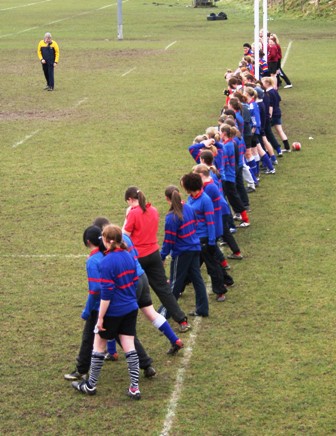
Dave Robinson: hoping for a national coach management system
Coaching's pause for thought
Two years ago Dave Robinson launched a pilot project in Manchester and Merseyside which rapidly became a guiding light for coach managers across the sports system but, having briefly lit up the coaching night sky, Coaching North West is being put on the back burner. With a pretty mixed metaphor now exhausted, The Leisure Review tried to find out why.

Dave Robinson: hoping for a national coach management system
The Coaching North West pilot project has been running in Merseyside and Greater Manchester since March 2007 and will have concluded its activities, as planned, by 31 March this year. It has been a successful and eventful two years for the project and when The Leisure Review interviewed its operations manager, Rob Burchell, in July 2008 it was going great guns. Why then has this innovative and vibrant scheme which seemed to be revolutionising coaching management been put on the back burner?
The initial brief of the pilot was simply to establish a coaching agency that would match coaches to coaching opportunities with the support of a fully integrated on-line system; it was also to investigate whether such an agency could operate as a self-sustaining, not-for-profit organisation. However, Rob and his project were quickly forced to expand their remit, and the staff team, to accommodate a whole range of additional coach development issues which had to be addressed before the initial recruitment and deployment objectives could be met. Coaching North West quickly became the closest thing we have to a functional quality assurance scheme for coaching.
To make this happen the project team had to factor in a way of identifying suitably qualified coaches for specific coaching tasks, a means of profiling coaches and a method of addressing the whole area of coach management, including minimum operating standards, rates of pay, qualifications, professional development and recording coaching activity. This was no mean feat and one that attracted the eyes and approbation of Sportscoach UK, Sport England and agencies such as county sports partnerships (CSP).
For the record 1,313 coaches and 150 employers were signed up; 6,958 coaching sessions were delivered in 32 different sports and the pilot project awaits reports from two evaluations currently being finalised by the University of Central Lancashire and Sportscoach UK. Both are expected to be positive so, again, why has the project been mothballed?
We asked Dave Robinson, a man widely respected within the sports development fraternity, if he was disappointed by the developments, or the lack of them. “I don’t feel disappointed,” he said. “In fact I am optimistic. The national progress has been slow – much slower than I had hoped – but that has been mainly due to all the structural changes at Sport England and the knock-on effects. I am very hopeful that this will be picked up nationally. Much work is ongoing and the vibes are good.”
Which is a very positive take indeed on what looks like a backward step by those we trust to run our ‘sports system’. We quizzed him on how he managed to be so upbeat. “We have just done a tour of CSPs to share our developments and experiences,” Dave explained. “The feedback has been incredibly positive, so much so that we have eight CSPs signed up to using the system regardless of what happens nationally. We couldn’t cope with any more so the remaining CSPs have had to settle for having signed expressions of interest with a view to getting involved either if a national decision to take the system on goes in our favour or for them to work directly with the on-line developers should this not happen.”
The on-line coach management system – called CoachWeb – is going national with Athol Few from the Coaching NW team being seconded to software developers Byng Systems to ensure continuity. The CSPs in the North West have taken the system on and will be using it both to support coaches and to manage their bursary programmes. This was an aim when the pilot started so must count, in Dave’s view, as “a result”. All the coaches signed up to the programme will be allocated to one of the four CSPs, as will the network of coach advisers and coaches, who will be able to link to more than one if their work requires it.
This means that coaches will be employed and deployed, and may even be monitored and developed. But will the CSPs and others that pick up CoachWeb continue the work on quality assurance that was such a significant by-product of the Coaching North West pilot? With the commissioned reports still outstanding, Coaching North West has drawn its own conclusions:
“In the absence of these reports, we can offer the views of Coaching North West and their key partners as to the main deliverables emerging from the pilot.
“The pilot has developed a comprehensive online support system and a quality assured process which can identify, recruit, advise, train, deploy and record the activity of coaches. The pilot has also developed a system and set of guidelines to support the management [of] coaches. This comprehensive coach development support package has the capability to be rolled out for use by all organisations that support the development of coaches.
“The pilot was unable to establish a coaching agency which could operate without subsidy as a not-for-profit organisation, whilst at the same time adhering to the standards and constraints currently recommended as best practice by the industry. Indeed, the evidence from the pilot suggests that it will be several years before the industry is mature enough to be able to sustain such an agency.”
In the course of our work The Leisure Review meets people from all parts of the sports system and we listen to what they say. Recently we heard from a Youth Sport Trust partnership development manager who told us that they had written to head teachers because they had “guilty knowledge” of unqualified coaches being used to deliver gymnastics paid for by PPE funding. We also spoke to a very senior coach manager who told us that they knew that there were still people going into school sessions who were saying, “I’m Phil, here’s a ball, play football,” and calling themselves coaches.
Our only question – and you may have heard something like this before – is this: with this kind of abuse still happening in the name of ‘coaching’, can the sports system afford to let the light shone on the process of coaching management by the Coaching North West team be extinguished, whether by default, design or death by bureaucracy?
But we’ll leave the last word to Dave and his team: “Will there be life after Coaching North West? We are hopeful that one of the legacies of this project will be a national coach management system used by all of the major sporting organisations across the UK. You can dream can’t you?”
The Leisure Review, April 2009
© Copyright of all material on this site is retained by The Leisure Review or the individual contributors where stated. Contact The Leisure Review for details.
